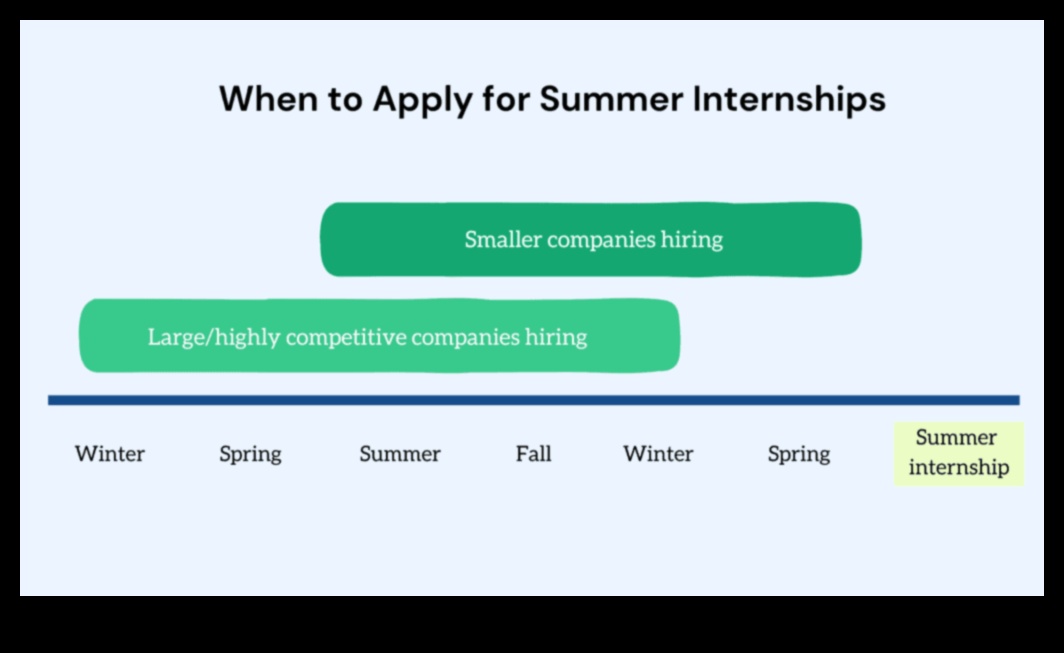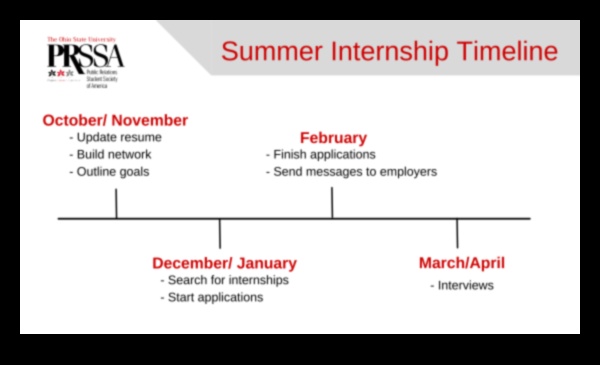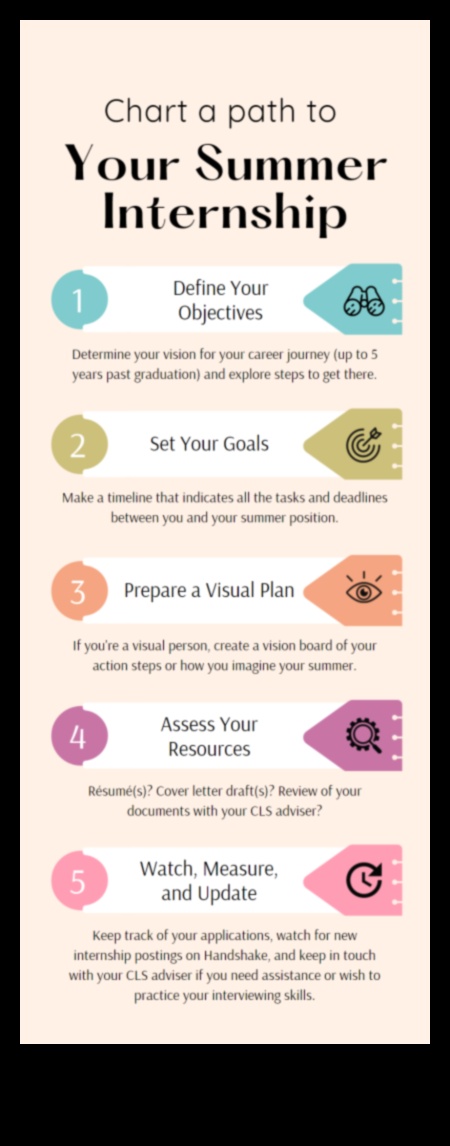
Summer internships typically start in May or June and end in August or September. However, the exact start and end dates can vary depending on the company and the industry.
Some companies offer summer internships that are only a few weeks long, while others offer internships that last for the entire summer. It’s important to research the specific internship you’re interested in to find out when it starts and ends.
If you’re a student who is interested in getting a summer internship, it’s important to start your search early. Most companies start accepting applications for summer internships in the fall or winter.
You can find summer internship opportunities on company websites, job boards, and through your college or university career center.
Once you’ve found a few summer internships that you’re interested in, it’s time to start applying. Be sure to tailor your resume and cover letter to each specific internship you’re applying for.
If you’re invited to interview for a summer internship, be prepared to answer questions about your skills, experience, and goals.
Getting a summer internship can be a great way to gain valuable experience, learn new skills, and network with professionals in your field.
If you have any questions about summer internships, please feel free to contact us.
| Summer Internship Start Dates | Summer Internship Applications |
|---|---|
| May-August | January-March |
| Varies by company | Varies by company |
| Full-time or part-time | Full-time or part-time |
| $15-$25 per hour | $15-$25 per hour |

II. Benefits of summer internships
Summer internships can offer a number of benefits to students, including:
- Real-world experience
- Networking opportunities
- Mentorship
- Financial compensation
- A leg up on the competition
Summer internships can help students gain real-world experience in their field of interest. They can learn about different industries, companies, and job functions. They can also develop their skills and build their resumes.
Summer internships can also provide students with networking opportunities. They can meet with professionals in their field and learn about their career paths. They can also build relationships with potential employers.
Summer internships can also offer students mentorship. They can learn from experienced professionals and get guidance on their career goals.
Summer internships can also provide students with financial compensation. This can help them pay for school or save for the future.
Finally, summer internships can give students a leg up on the competition. They can show potential employers that they are motivated, hard-working, and have a strong work ethic.
III. How to find summer internships
There are a few different ways to find summer internships. Here are some of the most popular methods:
- Search online job boards
- Network with your friends, family, and professors
- Contact companies directly
- Attend career fairs
- Use internship search engines
Each of these methods has its own advantages and disadvantages. For example, online job boards can be a great way to find a wide variety of internships, but you may have to compete with other applicants. Networking can be a more personal way to find an internship, but it can also be more time-consuming. Contacting companies directly can be a great way to get your foot in the door, but you may not hear back from every company you contact. Attending career fairs can be a great way to meet with employers face-to-face, but you may only have a few minutes to talk to each employer. Internship search engines can be a great way to find internships that are a good fit for your skills and interests, but you may have to pay a fee to use some of these services.
Ultimately, the best way to find a summer internship is to use a combination of these methods. By casting a wide net, you’re more likely to find an internship that’s a good fit for you.

When do summer internships start?
The start dates of summer internships vary depending on the company and the industry. However, most summer internships typically start in May or June and end in August or September.
Some companies may offer early-start internships that begin in April or May, while others may offer late-start internships that begin in July or August.
If you are interested in a summer internship, it is important to research the start dates of the internships that you are interested in so that you can plan your schedule accordingly.
You can find the start dates of summer internships on the company website or by contacting the company directly.
Here are some examples of the start dates of summer internships at different companies:
- Google: May
- Facebook: May
- Amazon: June
- Microsoft: June
- Apple: June
Keep in mind that these are just a few examples of the start dates of summer internships. The start dates of summer internships can vary depending on the company and the industry.
If you have any questions about the start dates of summer internships, you can contact the company directly.

V. Summer internship interview tips
Summer internships can be a great way to get your foot in the door at a company you’re interested in working for. However, in order to get the internship, you’ll need to impress the interviewer. Here are a few tips for summer internship interview success:
- Do your research on the company and the position you’re applying for.
- Be prepared to answer questions about your skills and experience.
- Be enthusiastic and show your interest in the company.
- Be professional and dress appropriately for the interview.
- Thank the interviewer for their time and consideration.
By following these tips, you can increase your chances of getting the summer internship of your dreams.
When do summer internships start?
The start dates of summer internships vary depending on the company and the industry. However, most summer internships typically start in early June and end in late August.
Some companies may offer early-start internships that begin in May or even April. These internships are typically reserved for students who are graduating early or who have already completed their sophomore year of college.
Other companies may offer late-start internships that begin in late July or early August. These internships are typically reserved for students who are taking summer classes or who have other commitments during the early summer months.
If you are unsure of the start date of a particular internship, it is best to contact the company directly to inquire.
VII. Summer internship housing options
There are a few different options for housing when you intern during the summer. You can choose to live in on-campus housing, off-campus housing, or with a host family.
On-campus housing is often the most convenient option, as it is located close to your internship and other campus amenities. However, it can also be the most expensive option.
Off-campus housing can be a more affordable option, but you will need to find a place to live that is close to your internship. You can find off-campus housing through a variety of sources, such as online listings, student housing offices, or real estate agents.
Living with a host family can be a great way to immerse yourself in the local culture and make new friends. However, it can also be the most expensive option.
When choosing a housing option, you should consider your budget, location, and personal preferences.
Here are some factors to consider when choosing a housing option for your summer internship:
- Your budget
- Your location preferences
- Your personal preferences
Once you have considered these factors, you can start narrowing down your options and find the best housing option for your summer internship.
Summer internship resume tips
A well-written resume is essential for landing a summer internship. Here are some tips for writing a resume that will impress potential employers:
- Use keywords relevant to the internship you are applying for.
- Highlight your skills and experience that are relevant to the internship.
- Tailor your resume to each individual internship you apply for.
- Proofread your resume carefully and correct any errors.
For more detailed tips on writing a resume, check out the following resources:
IX. Summer internship thank-you notes
Thank-you notes are a great way to show your appreciation to the people who have helped you during your summer internship. A well-written thank-you note can also help you stand out from other candidates and make a good impression on your potential future employers.
When writing a thank-you note, be sure to include the following elements:
- The name of the person you are thanking
- The date
- A specific statement about what you are thanking the person for
- A closing statement
Here is an example of a thank-you note that you could write to your summer internship supervisor:
Dear [Supervisor’s name],
I am writing to express my sincere gratitude for your guidance and support during my summer internship at [Company name]. I learned so much during my time here, and I am grateful for the opportunity to have worked with such a talented and dedicated team.
I especially appreciate the time you took to mentor me and help me develop my skills. I will take the lessons I learned here with me as I continue my career.
Thank you again for everything. I wish you all the best in the future.
Sincerely,
[Your name]
X. FAQ
Q: When do summer internships start?
A: Summer internships typically start in May or June and end in August or September.
Q: How do I apply for summer internships?
A: You can find summer internships on job boards, company websites, and through your college or university career center.
Q: What are the benefits of summer internships?
A: Summer internships can help you gain valuable work experience, learn new skills, and network with professionals in your field.